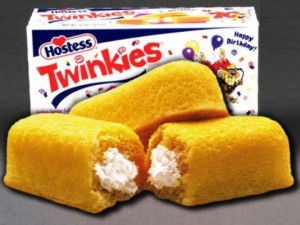 Can the Twinkie and other famous Hostess brands be saved? I hope so, and I’ll offer my own two cents’ on one possible way of doing so. First, though, I’d like to address two of the criticisms of my previous article—namely, that I confined my comments to the Bakery union and the allegation that I “hate” unions.
Can the Twinkie and other famous Hostess brands be saved? I hope so, and I’ll offer my own two cents’ on one possible way of doing so. First, though, I’d like to address two of the criticisms of my previous article—namely, that I confined my comments to the Bakery union and the allegation that I “hate” unions.
Yes, it’s true that I did not write a comprehensive diagnosis of the chain of events that brought Hostess to the brink of liquidation. My focus was simply on what, to me, is the astounding and sad decision by the Bakery union to deep-six their own jobs.
That is not to say that the bakers are solely responsible for Hostess’ demise. The Teamsters surely share in the blame for the massive inefficiencies that their work rules and featherbedding imposed on Hostess.
As for management’s alleged culpability, I don’t know enough of the particulars to judge. I’m sure they made some mistakes. Who doesn’t? I wonder, though, whether any management team would be brilliant enough to make Hostess profitable, given the union-imposed inefficiencies and the challenge of funding and administering Hostess’ several hundred collective-bargaining agreements and health and benefit plans.
Furthermore, I question the arithmetical skills of those who claim that management bonuses comprised half the problem. Let’s say for the sake of argument that Hostess’ managers gave themselves $60 million in bonuses. (One figure I read was $6 million, but I can’t verify that, so I opted for a larger figure.) Even if those $60 million bonuses were cancelled or retrieved, that wouldn’t come close to eliminating the company’s annual red ink of $341 million. In comparison, the compensation packages for 18,500 current employees, plus who knows how many retirees, must be somewhere around $1 billion per year. I’m not asserting that the bonuses were justified, but for anyone to say that management bonuses constitute “half” of the company’s financial problems doesn’t add up.
Now, in response to the charge that I hate unions, that’s just absurd and unfounded. First, I don’t hate anyone. (Actually, I think the pro-union people who sent vile emails to me might be projecting their own hatred onto me.) In essence, I am neither pro-union nor anti-union. I believe that a person should be able to exercise the right of free association and join a union, and also should be free to not join a union as a condition of holding a job if the person doesn’t want to join.
I have been on the workingman’s side at least since working as a janitor at Chrysler over four decades ago. I think unions sometimes make poor decisions (the Bakery union’s being the most recent example) and that is why I have urged unions to adapt so that they can thrive in the 21st century. I have even argued that there should be more unions—a goal to be accomplished by removing the current monopoly status that unions have. That way, additional unions could form, resulting in competition between unions that would yield better service to rank-and-file workers, just as competition between businesses leads to better service to consumers.
Okay, here is what I propose with regard to Hostess:
Instead of selling off the Twinkie and other famous brands to outside interests, let the owners either give them or sell them at a discount to the Bakery Union. Other unions have lined up financing to buy the factories where they worked. Then, the union members could pay themselves whatever they think they deserve—no more of the toxic “management is the enemy” atmosphere. They could charge whatever price they want for the Twinkies they would make. They could bake as many or as few as they wanted and do so in the way of their choosing. They could hire whomever they wanted to manage the business and set their compensation—no more unjustified bonuses to resent. The Bakery Union could hire whomever they wanted—Teamsters or non-Teamsters—to drive their products to market.
Such a change in ownership could be a very effective learning experience, not just for the Bakery Union and the Teamsters, but for other unions and the American public, too.
Long live the Twinkie!
Editor’s note: A version of this article first appeared at Forbes.com.



